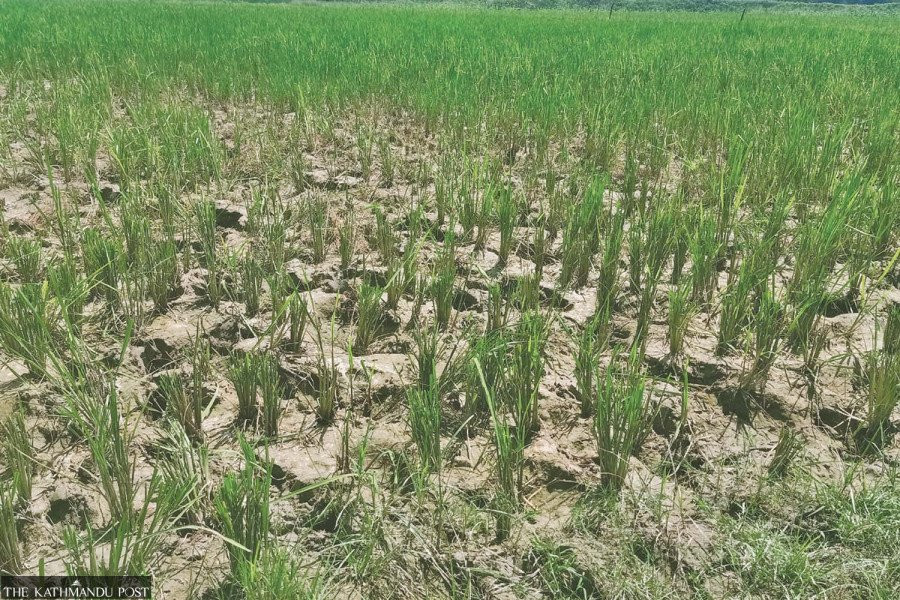National
Farmers in drought-hit hills unable to sow maize
Droughts and dry spells in the cultivation season and flooding in the harvesting time have become a new normal in Nepal.
Arjun Poudel
On Thursday morning last week, Ganesh Neupane from Beteni, ward 3 of Kalika Rural Municipality in Rasuwa district, went to his field with a spade to check if the soil was moist enough to sow maize. It had rained the previous evening after a prolonged drought.
“The land was ready for planting, but the problem is hybrid maize seeds are not available in our area,” complained Neupane. “We even went to Kathmandu looking for hybrid maize seeds, but we couldn’t find any there either.”
This year, several districts, including Rasuwa, experienced drought-like conditions, which prevented farmers from cultivating maize on lands that rely mostly on rainwater.
As the maize cultivation season has already ended, the premonsoon rainfall, which occurred only in the last week of May, could not bring relief to farmers like Neupane and other villagers of Rasuwa. Some farmers want to cultivate water-resistant and fast-maturing hybrid crops, but seeds for such crops are not available in the market.
“If we sow locally available seeds, plants will grow quickly, and they will be knocked down by wind and rain,” complained Anjila Wasti, another villager. “Seeds cultivated in April either didn’t germinate or were eaten by pests.”
Nepal has been affected by the climate crisis. Over the past few years, droughts and dry spells in the cultivation season and floods and inundations in the harvesting season have become a new normal in the country.
A recent report of the National Climate Change Survey-2022, carried out by the National Statistics Office, states that climate change has far-reaching consequences, impacting communities, transportation, water resources, biodiversity, agriculture, health, and the economy.
The intensification of climate extremes, such as high temperatures, heavy rainfall, drought, landslides, floods, and wildfires, has made predictions of impacts more challenging.
Climate change has significant and far-reaching impacts on agriculture in Nepal, a predominantly agrarian country with a large portion of its population engaged in farming, reads the report. “These impacts affect crop yields, food security, and the livelihoods of millions of people.”
Over the past 25 years, approximately 50 percent of households reported the emergence of new diseases in their crops, nearly 54 percent observed the presence of new insects or pests affecting their crops, and around 30 percent of households noted the appearance of new diseases in their livestock.
Government agencies, which are not tired of discussing “climate change adaptation action”, do not bother to offer drought- and water-resistant seeds to affected farmers.
“We are only addressing the immediate effects of drought and climate crisis on farmers,” said Madhukar Upadhya, an expert on climate change. “Climate change, prolonged drought for instance, will have chain effects on food security, animal husbandry, health, education, and women empowerment.”
When the authorities failed to take necessary measures to protect farmers from erratic weather patterns, migration became their only option.
Kabita Khatri, the mother of a five-year-old girl from Bidur in Nuwakot district, has found a housemaid job in Kathmandu. She said that the landlord has committed to paying her daughter's school fees and providing meals for both her and her daughter.
“I have my own home in the village close to the highway,” said Khatri. “But the house does not give food. We will go hungry if we rely on the food grown on our land.”
Nepal is one of the world's most vulnerable countries to the climate crisis and has witnessed extreme weather events over the past decade and a half.
Evidence suggests that Nepal's maximum temperature is rising at a greater rate (0.056 degrees Celsius per year) than the global average of 0.03 degrees Celsius per year.
“Multiple agencies are responsible for supporting affected people, including farmers, to adapt to the effects of climate change,” said Dr Santosh Nepal, a climate change expert. “However, due to a lack of coordination among the agencies concerned, climate effects have only become a topic of discussion. Affected people are not getting the relief and support they need.”




 13.12°C Kathmandu
13.12°C Kathmandu














